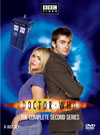DVD Extras (box sets only) include:
"Blahhh! Aren't you scared?"The opening is limp, to say the least. First of all, we're not only on Earth, and in London, and at virtually the present day at a point in the series when we still feel desperate to see something of the rest of the galaxy, but the story feels the necessity of showing us what an average domestic little street this is... the very thing Russell Davies always wants to encourage the audience to look beyond. In fact this looks so much like "The Idiot's Lantern" (story no. 177) which was shot back-to-back with this story as the season's 4th recording block, it feels like a bit of an unpleasant re-run. And just to make the shooting additionally problematic, the story absolutely calls for summer, while the schedule insists it be filmed in January. Nice one, guys; just what are you thinking coming up with these awkward uninspiring requirements? The "Claws of Axos rewrite" that Nick Briggs hints might occur at the last minute on "Rise of the Cybermen" (story no. 176), and can be found in the deleted scenes for "The Impossible Planet" (story no. 178), actually makes it into the finished program here.Worse is the "action" intended to spark some sense of mystery or threat. Too many unfamiliar characters appear on screen for the audience to be able to follow what's going on, and the writer's intended mystery is lost while we wonder what it is we're supposed to be noticing. It's also unclear why we science fiction fans are being made to listen to a little girl sing a silly uninspiring song while her mother downstairs looks like she has an upset stomach. Not a very tasteful combination of elements for the show's supposed genre. Without giving away the entire teaser, let's just say that it makes a very disjointed cut to the title sequence. You can read a more detailed dissection in the In-depth Analysis version of this review. The story's title was up next: "Fear Her", which only seemed to underscore the limpness of the opening, as though the story's makers were so desperate to make the audience afraid of the little girl, they had to resort to writing the command on screen. It's all too reminiscent of the man in the bear suit at the beginning of "The Androids of Tara" (story no. 101), and fails for essentially the same reason. At this point, I was sure I would be sitting through a turkey of an episode, one that clearly attempted to design itself around fear (bad move!) coming to visit the average Londoner (how commonly boring!), instead of exploring the universe as Doctor Who and science fiction should. Felgercarp!
On the other hand, if a materialization is made dramatic, what's going on philosophically? Characters are arriving, coming out to meet challenges head-on heroically, or starting out on a new exploration, or about to have a reunion with other characters. Much better, and on purpose for sci-fi adventure. And only the sound for materialization has that extra "thud" at the end that adds that little extra bit of coolness and authority to the new presence of the Doctor's machine at the scene. The question is such a no-brainer, one can only hope that Gardner was merely trying to coax more excited discussion out of Matthew Graham's exuberant remarks. However, the production team managed to overlook this question so completely for the earlier parts of David Tennant's era, you have to wonder if they understand this even now. Graham may have got materialization right, and devised enough of a gag with it that the producers didn't cut it, but the remainder of the Doctor and Rose's introductory scene is not that great. After uncharacteristically waiting just a bit too long to open their mouths, they prove that they can't put together an easily understood proper English sentence. David Tennant rattled through his opening dialogue so quickly, replete as it was with British idioms, I had to turn on the closed captions on the DVD to begin to make some sense of it all. Equally uninspiring is the use of a sidewalk discussion amongst neighbours to supposedly launch the investigation of the story's main mystery, particularly as it gets mired in fingerpointing. Which brings us to the infamous scene with the cat. There's plenty of footage in the extras showing how bone-headed the production crew were in their attempts to wrangle the cat and get it to perform on screen. Pulling with thin wires? Ugghh!! As a part-time cat whisperer myself, it makes me cringe. Utmost in my mind is the question of why they even want a shot of the cat going into a cardboard box to do a disappearing act. Behaviourally speaking, there's no reason why the cat should want to do it. (Give us a kitten, and things might be different.) Equally, the story would be far better off without the cardboard box. The sequence seems to me to be designed for a level of special effects so unsophisticated that only live television or a stage performance would need it... making the cat disappear while behind a box when you couldn't see it. Lots. There isn't much quality story here, trying to make a mystery out of the disappearance of the cat, or the character in the opening. Show the two of them clearly morphing into nothingness, and you improve the visual literacy of the story enormously. And the cat can stay in character and be easier to wrangle while peacefully sunning himself. If you're lucky, he may even act up a good Cheshire smile for you. What golden opportunities are so clumsily fumbled away here.
Ionic IsolusTime to heap some praise on one of the story's core ideas: the concept of the Isolus and its ionic properties. Brilliant. Nearly all of the story's original imagination is focused on this idea, and it's a beautiful one. It comes complete with some wonderful visuals. Nice. It's just a pity we don't get more of that on screen in the story.... which is one of the major problems.The Isolus concept would be great to explore - note the operative word here is explore - in greater depths, although I'll only give away my full idea in the In-depth analysis version of my review. Instead, what we're actually stuck with proves less interesting and ultimately unconvincing. Abisola Agbaje gives a remarkably solid performance as 12-year-old Chloe Webber, particularly during a pivotal scene in the middle of the story, where some very nice effects are achieved directorially. But Doctor Who is a show that is usually far more adept at getting into the kind of strange worlds that are only hinted at here. Sadly, it isn't long before the perceived budget limitations fill our screen time with far less desirable elements. Far too much time is spent singing very silly songs. And the idea of a cheap drawing of mean, scary old Dad coming to get us and hurt us provides story beats of utter rubbish quality. The cheap red light and shadows used to represent him, apart from being as far from satisfying as possible, are also extremely unflattering for Chloe and her mum's dark skin tones. Other items that begin to work wonderfully are the scenes between the Doctor and Rose, particularly the ones inside the TARDIS later on in the story. There are some really nice moments here, that fans will not want to miss. The Doctor is on form, and seems to be all set to move the story into a fascinating bit of resolution. Then another huge plot mistake is committed during the concluding act, resulting in another unforgivable lost opportunity. Sad. The actual resolution of the main plot manages to be emotionally beautiful, and even worthwhile. Sadly, it has to share screen time with the retarded "scary Dad" problem as well. The final scene contains some nice moments, slightly marred by Rose's growing clinginess towards the Doctor. Anticipation towards a great season finale is built up nicely - enough so that the ad for next week clumsily fused into the credit sequence, which reveals too much too soon, could really be dispensed with.
Revealing ExtrasWriter Matthew Graham is an engaging and lively presence on the DVD commentary, making this one of the better ones in this set. The commentary is also all too revealing of the origins of this story's worst mistakes: focusing too exclusively on children as the intended audience (which so many production members of eras past have lobbied hard to overcome), and, as is obvious, trying too hard to look for scares and frights and fears whether it makes sense for the ideas, characters, and situations you're exploring or not. No wonder so many of the best opportunities escaped the writer.Most bizarre is the kernel of the idea that executive producer / head writer Russell T. Davies gave to Graham as his assignment: to develop an idea similar to "The Picture of Dorian Gray". I hadn't seen the parallels, perhaps largely because Dorian Gray works in ways that "Fear Her" never comes close to touching. Psychologically, Dorian Gray explores the fantasy of never having to face the consequences of your actions or your age, and what one might do with that. His picture itself isn't scary either. The fact that it represents horrific glimpses of what those procrastinated consequences might be is what gives the idea its edge and effectiveness. The series "Blake's 7" successfully managed to evoke this in its season 4 opener, AND completely avoided the unnecessary Earth/England setting.... Not that that was the greatest story of science fiction or Blake's 7 by any stretch. But "Fear Her" doesn't come close to evoking a Dorian Gray idea, although it could have been a worthy something else had its writer known what its true strengths were and developed them better.
Ultimately though, this season's fourth recording block has been a bit of a royal waste of Doctor Who's budget and schedule. Instead of trying to do two stories that can't afford a setting beyond Earth, they would have done much better creating a single story, in two parts, in one setting - hopefully far from Earth. Remember, this balance between budget and quality is why four-to-six part stories for each setting were originally recommended when Doctor Who was first created in 1963. Remember also, not every alien planet needs the complicated CGI effects and location work of an "Impossible Planet" type story. Just do something a little unusual, within your budget, and say it's a far out colony or alien culture, rather than the Earth or a copy of. It would go such a long way to make the remaining Earthly episodes more refreshing.
"Fear Her" is available on DVD. Click on the Amazon symbol for the location nearest you for pricing and availability:
Note: The full season sets contain commentaries, behind-the-scenes featurettes, and other extras. The smaller volumes only feature the plain episodes. Comments on this article are welcome. You may contact the author from this page:
|








